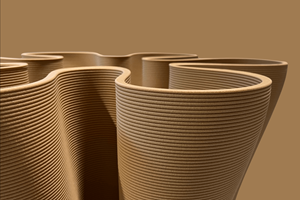Škoda Motorsport partners with Bcomp for Enyaq RS Race program
Growing on success with the Fabia RS Rally2 racing model, Škoda’s Enyaq RS Race electric SUV design incorporates key flax fiber interior and exterior components.
Škoda Enyaq RS Race. Source | Bcomp
Swiss sustainable lightweighting company Bcomp (Fribourg) has collaborated with (Plazy, Czech Republic) to integrate natural fiber composites into the Škoda Enyaq RS Race and Škoda Fabia RS Rally2, marking a new chapter for the use of innovative, sustainable materials at Škoda Motorsport.
“While motorsport is often about all-out performance, sustainability is integral to the long-term relevance and success of racing,” Michal Hrabánek, head of Škoda Motorsport, says. “When we started working with Bcomp on the Fabia RS Rally2, we quickly realized that it was possible to achieve our performance metrics while embracing ‘sustainable lightweighting’ with natural fiber composites. Now, we have built upon this success with the Škoda Enyaq RS Race.”
RS Race flax fiber details. Source | Bcomp
The Škoda Motorsport projects uses Bcomp’s flax fiber ampliTex technical fabric and powerRibs reinforcement structure technologies. Both solutions have been proven in several other motorsport and automotive collaborations. In addition to producing parts with high stiffness and optimal damping properties, ampliTex and powerRibs are reported to offer up to 85% CO2 emission reduction from “cradle to gate”; at the end of their life, parts can be used for thermal energy recovery without residual waste in the standard waste management system.
The Škoda Enyaq RS Race is a fully functional electric SUV concept car from Škoda Motorsport based on the Enyaq Coupé RS production model but with several modifications to improve its performance and efficiency. This includes the use of Bcomp’s materials, which contribute to a 316-kilogram reduction in the car’s overall weight compared with the standard Enyaq Coupé RS. It is the latest project to come from the collaboration with Bcomp, benefiting from the success and lessons of the Škoda Fabia RS Rally2 program.
Enyaq Coupé RS versus the Enyaq RS Race. Source | Škoda Motorsport
The vehicle is powered by two electric motors producing a combined 340 horsepower, all-wheel-drive, carbon discs and sport suspension to create a compelling high-performance package. The car has a reinforced body structure, and just like the Škoda Fabia RS Rally2, it features numerous parts made from Bcomp’s sustainable flax composites, including the roof, fenders, bumpers, sills, rear wing, co-driver footrest and leg rest, and more.
For the Škoda Fabia RS Rally2 program, Škoda Motorsport and Bcomp collaborated to identify potential applications. This resulted in the extensive use of flax composites throughout the interior and exterior of the rally car, including bumpers, mirror housings, footrests, padel box, leg rests and gearshift grommets. Conventionally, these parts would be made from carbon fiber, resulting in high lifecycle emissions.
The Škoda Fabia RS Rally2 received homologation from the Fédération Internationale de l’Automobile (FIA) in September 2022, and even won its competitive debut at the Lausitz Rally in Germany. According to the company, it has been a mainstay of WRC2 ever since. So far, more than 100 Škoda Fabia RS Rally2 cars have been delivered to customers and the total number of Škoda Fabia cars in the Rally2 variant produced since 2015 has exceeded 600.
“Our collaboration with Škoda Motorsport has demonstrated what is possible when an OEM maintains an open mind about material selection and more sustainable alternatives,” Johann Wacht, key account manager, automotive and motorsports, at Bcomp, adds. “The Škoda Enyaq RS Race builds upon our success with the Fabia RS Rally2. It is laying the groundwork for race-to-road technology transfer, bringing sustainable composites into production models.”
Related Content
Welding is not bonding
Discussion of the issues in our understanding of thermoplastic composite welded structures and certification of the latest materials and welding technologies for future airframes.
Read MoreSulapac introduces Sulapac Flow 1.7 to replace PLA, ABS and PP in FDM, FGF
Available as filament and granules for extrusion, new wood composite matches properties yet is compostable, eliminates microplastics and reduces carbon footprint.
Read MorePlant tour: Teijin Carbon America Inc., Greenwood, S.C., U.S.
In 2018, Teijin broke ground on a facility that is reportedly the largest capacity carbon fiber line currently in existence. The line has been fully functional for nearly two years and has plenty of room for expansion.
Read MoreComposites end markets: New space (2025)
Composite materials — with their unmatched strength-to-weight ratio, durability in extreme environments and design versatility — are at the heart of innovations in satellites, propulsion systems and lunar exploration vehicles, propelling the space economy toward a $1.8 trillion future.
Read MoreRead Next
Roboze supports F1 composite brake cooling duct manufacture
Carbon fiber-reinforced PEEK composites, 3D printing services improve production time and costs of complex motorsport parts for Visa Cash App RB F1 team.
Read MoreMelker of Sweden accomplishes sea kayak with 100% sustainable composite construction
Built with ampliTex flax fabrics, a solid cork core and Sicomin plant-based resins, the company’s Värmdö kayak model highlights an environmentally conscious design for paddlers of all levels.
Read MoreModeling and characterization of crushable composite structures
How the predictive tool “CZone” is applied to simulate the axial crushing response of composites, providing valuable insights into their use for motorsport applications.
Read More












